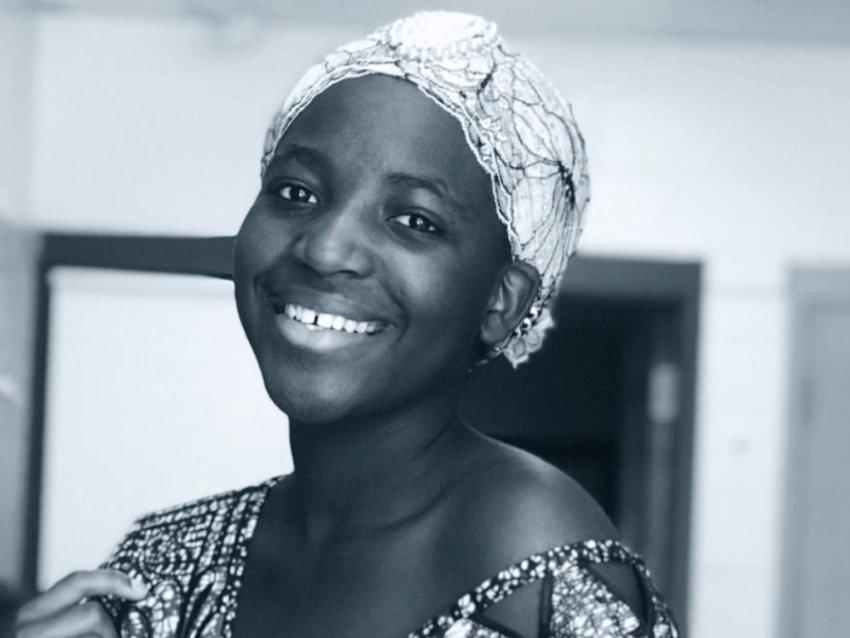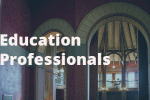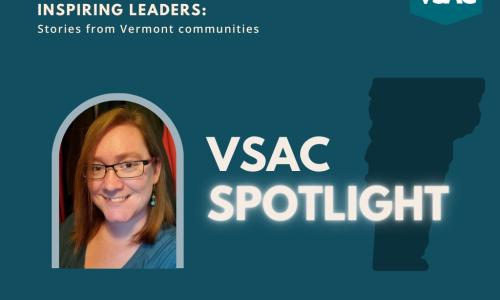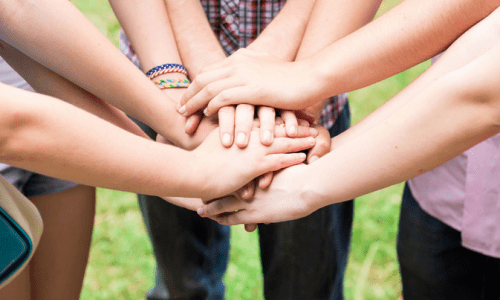VSAC transferred the servicing of your Federal Student loans to American Education Services and the guarantee of all VSAC Federal Student loans to the Trellis Company, an approved Federal Guaranty Agency, over the weekend of March 16th. CLICK HERE for more information.
Passy Matendo: A humble and beautiful voice to help educate the next generation

When Passy Matendo signs on to a Zoom meeting, her name appears on the screen as “Maombi.” “It’s what I’m called at home,” she explains. In Swahili, the word literally means “prayers” or “supplications,” and as a name, it is often loosely translated as “gift from God.”
Since coming to the U.S. from eastern Africa eight years ago at age 10 with her parents and several younger siblings, Passy has become adept at balancing two very different cultures. At first, the change was a shock. “Coming to a new place, trying to learn a new language, getting used to a new culture–and very different weather–was difficult,” recalls Passy. Now, as a senior at Winooski High School, that experience gives her a humble and insightful perspective on American culture and has prepared her well to teach young children. The oldest of seven children, Passy has taught her siblings at home from an early age, and now, she hopes to grow a career in education.
Passy was born in Congo and spent most of her childhood in a refugee camp in Tanzania.
I remember fetching water and carrying a gallon bucket on my head to wash my family’s clothes. But I also remember going to school, singing songs to start the day, and cooking in small pots with my friends. Even though in Tanzania life was a little bit hard, I miss home.
“We came here for a better life and more opportunities,” says Passy. And while she says her parents have been able to realize their vision (she notes that they both have good jobs here), she asserts that there are also some downsides to realizing the “American Dream.”
“Here, we have food, shelter, all of that, but the community is so different. All that I used to do as a child, and the holidays we used to celebrate, it’s impossible here.” She recalls celebrating the New Year together with family, eating traditional dishes of rice, beans, and chicken, getting dressed up and celebrating with friends and family. “Here, we’re not living together with other people, and my parents are working a lot,” both to support their large family here, and to send money home. “Our family in Africa depends on us,” she explains.
Blending cultures with family and community
Passy, who loves to sing, also misses the ceremonial manner that they would start the school day in Tanzania–with song. “You would start by singing the national anthem and some religious songs. Then you’d begin your classes. Here, you come in and just get going.”
Passy’s favorite activity is singing, both in her chorus class and in a regional music festival that she’s participated in. “We get to meet with students from other Vermont schools, learn songs together, and then perform in a concert. I really enjoyed that.” She intends to continue singing in college, where she plans to study elementary education.
With two younger brothers and four younger sisters, ranging in age from five to 15, Passy says she’s already had lots of experience in working with younger children.
“I really enjoy my time with my siblings. I also did a senior capstone project this year where I volunteered in a second-grade classroom three days a week as a teacher’s assistant, working on reading and math, and serving as a mentor. I love working with kids,” says Passy.
She notes some important cultural differences between Africa and America in the way parents and teachers provide discipline. “In Tanzania, if you come to school late, or you cheat on a test, you get flogged on your hands or legs. Here, they give you a pass for being late. And American parents will put their kids in a ‘time out’ when they do something wrong. African parents are more strict,” she says.
She notes that her own parents have high expectations, “especially for me, being the oldest, but mostly because we’re the first generation here in America.” When asked if her parents expect her and her siblings to go on to college, she quickly laughs and answers: “Of course! I don’t think I have a say!”
VSAC, GEAR UP and supporting future generations
To achieve that college goal, Passy turned to Stevya Mukuzo, a VSAC Outreach Counselor who works with students at Winooski High School through the federally funded GEAR UP program. GEAR UP stands for Gaining Early Awareness and Readiness for Undergraduate Programs, and counselors take on a caseload of students in underserved middle and high schools to help students prepare for, and pursue, higher education and training. Stevya has worked with Passy for the last three years, helping her research schools, prepare college applications, and understand the complicated landscape of American college financial aid.
“VSAC has been very helpful. They’ve helped me with the FAFSA, with my essay, and with letters of recommendation,” says Passy, adding, “My parents had no information, since they didn’t go to college.”
Stevya says Passy has been one of the most inspiring students she has worked with.
Passy’s dedication to learning English and navigating the American school system is truly commendable. It's also impressive to see her balance cultural expectations, especially as the eldest in her family. Passy's commitment to her studies and her responsibilities at home reflects her strength and character. It's clear that Passy is not only hardworking but also carries a warm and humble spirit.
Passy is especially grateful to VSAC for facilitating visits to college campuses.
It’s so great for students to get the opportunity to visit colleges, because so many of us have busy parents who don’t have time to take us. The fact that VSAC offers that to us is amazing. Just seeing a college online is one thing, but actually going through the buildings, seeing the dining hall and so on in person, is a great experience.
Passy applied to 19 schools and was accepted to 10. Clearly, she’s a good student, to which she humbly responds, “we try.”
She’s waiting for more information on her financial aid offers before she decides which college she’ll attend. She’s looking for a small or medium-sized school that’s affordable, diverse, and has a strong community that offers help and support when she needs it. “Recently Stevya sent me a Financial Aid Comparison spreadsheet to help me balance the schools I’ve gotten into, and decide which ones are the best fit. That’s been really helpful.” (For more guidance, see VSAC’s resources for comparing college offers.)
As for her future after college, Passy wants to stay in Vermont, and hopefully teach in Winooski. Her favorite age group is second or third graders. “They’re easy to handle. They’re very smart, so innocent, and very funny. And so curious.”
Passy has fond memories of her own life at that age. “Even though I grew up in a refugee camp, I was happy as a child. I had friends, I had a community that knew me well and cared about me, and I had fun. I’m really grateful for that,” she says.
Motivational perspective
When asked where she’s been happier–Africa or America–she says she finds that question hard to answer. “I can’t compare that kind of [childhood] happiness to what I have now, because now I have a lot of adult stress.” She also notes that being happy in American culture comes at a price. “You have to work a lot to pay the bills,” says Passy, who also holds a part-time job at a restaurant to help out her family. “My parents have to take care of seven kids, and it’s not easy.”
But understanding that reality motivates her and offers her a valuable perspective that she can pass along to her future students.
“I know that getting a college degree will offer me the opportunity to earn more than I could with just a high school diploma. So, college is important–and I’m grateful that VSAC was there to help me through that process,” Passy says.
And while she advises her younger siblings to work hard, she also counsels them to take things slow–“Do your best, do your work, but don’t rush! Slow down and enjoy.”





